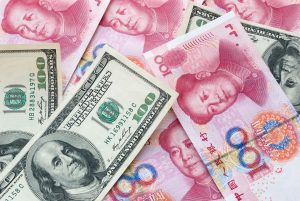In April, French President Emmanuel Macron found himself in hot water after making controversial statements in an explosive interview after a state visit to China.
The French leader warned against becoming “America’s followers” and reminded Europeans that if not enough is done to strengthen European autonomy, European countries “will become vassals” when tensions escalate between the United States and China.
These comments sent European policymakers into damage control, with Polish Prime Minister Mateusz Morawiecki declaring that “instead of building strategic autonomy away from the United States, I propose a strategic partnership with the United States.”
However, a largely overlooked remark by Macron may prove to be the most consequential. The French leader also suggested that Europe reduce its dependence on the “extraterritoriality of the U.S. dollar,” referring to Washington’s ability to deny countries access to the dollar-dominated global financial system.
This concern harkens back to former U.S. President Donald Trump’s decision to end Washington’s participation in the Iranian nuclear deal. That reintroduced a stringent sanctions regime that forced European businesses to withdraw from Iran or risk being sanctioned themselves. This unilateral decision drew fierce criticism from Europe of an alleged “weaponization” of the dollar that undermined European sovereignty.
Deals concluded surrounding Macron’s state visit to China seem to indicate a willingness by France to address this concern, namely by supporting the use of the Chinese yuan or renminbi in international trade.
For the very first time, a deal finalized during the visit between French shipping giant CMA CGM and China State Shipbuilding Corporation was made in Chinese yuan. It was the largest shipbuilding order made in China to date, with an order placed for 16 vessels valued at 21 billion yuan ($3.1 billion).
A week prior, France’s Total Energies and China National Offshore Oil Corporation concluded China’s first purchase of liquified natural gas (LNG) in yuan through the Shanghai Petroleum and Natural Gas Exchange.
“It is clear that French companies are seeking a form of protection against their perceived risks of the dollar, which China leverages to further its agenda of reducing its own exposure to American financial extraterritoriality,” observed Dr. Mathieu Duchâtel, the director of international studies at Institut Montaigne, a Paris-based think tank.
By using the yuan instead of the dollar, these transactions do away with U.S. banks as an intermediary. Amassing the Chinese currency also allows French companies to make purchases in China directly without the United States as a middleman. This arrangement could eventually radically transform the global role of Chinese banking institutions, as the internationalization of the Chinese currency would push them to the forefront of the international financial system.
These deals follow a growing trend of countries adopting the yuan for international trade. Last April, Israel added the yuan to its foreign currency reserves and in August Egypt said it would issue government bonds in yuan. This February, Iraq announced its intentions to allow trade from China to be settled in yuan, while Brazil completely abandoned the dollar in its commerce with China by agreeing with Beijing to trade in mutual currencies.
During his own visit to China, Brazilian President Luiz Inacio Lula da Silva openly bashed the centrality of the U.S. dollar. “Why should every country have to be tied to the dollar for trade?… Who decided the dollar would be the [world’s] currency?” questioned Lula in a clear rebuke of the role of the U.S. dollar. “Today, countries have to chase after dollars to export, when they could be exporting in their own currencies,” he continued.
For Paris, however, its stance on the issue is still far from evident. “It is much too early to tell if these renminbi-denominated deals signal a broader French support for the internationalization of China’s currency,” Duchâtel warned. “At this stage, there is only anecdotal evidence, but it is a trend worth observing.”
































